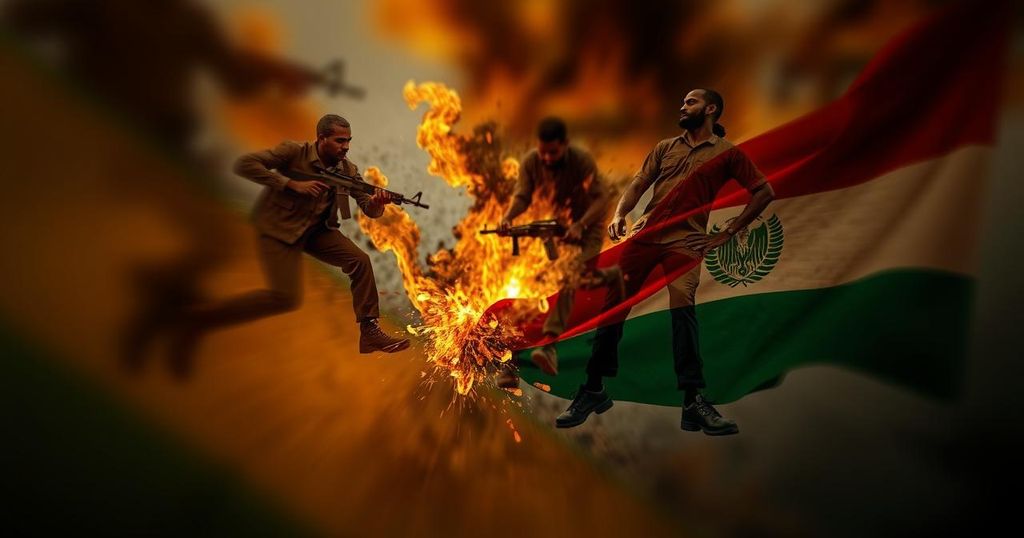Somalia’s defense agreement with Egypt has intensified tensions with Ethiopia, undermining regional security efforts against al-Shabaab. A recent mortar attack in Mogadishu illustrates the ongoing threat of the jihadist group, which continues to control significant territories. The European Union and other international actors must step in to mediate these tensions and prevent further destabilization in Somalia, as a failure could enable al-Shabaab’s resurgence while affecting regional stability.
The recent defense agreement between Somalia and Egypt has escalated tensions with Ethiopia and impedes efforts to combat al-Shabaab, the jihadist group threatening Somalia’s stability. A mortar attack in Mogadishu, claimed by al-Shabaab, highlights the persistent violence despite military advances against the group. With infighting within the anti-al-Shabaab coalition, fragmentation within Somalia’s government could enable the group to expand its control. As Ethiopia plays a critical role in current military operations, the new Somalia-Egypt pact could further destabilize efforts in the region, making it imperative for European countries to mediate these tensions to prevent chaos. Since 2007, the AU has led military engagements against al-Shabaab, yet the situation remains precarious as Ethiopia contributes significantly to these forces. Efforts to replace Ethiopian troops with Egyptian ones are tactically flawed as Egypt’s military is unlikely to commit the required resources amidst its own economic constraints and lack of familiarity with Somali dynamics. Additionally, Egypt’s recent arms shipments to Somalia have alarmed Ethiopia, further complicating the fragile military landscape. The ramifications of this geopolitical rivalry are stark. If the AU’s mission collapses, a security vacuum could arise, allowing al-Shabaab to enhance its influence across Somalia and threaten the broader Horn of Africa region. Furthermore, internal discord between Somalia’s federal government and its states over the Ethiopian troop withdrawal could exacerbate the instability, providing al-Shabaab an opening to expand its reach. The European Union has invested heavily in Somali security efforts and should leverage its influence to mediate escalating tensions between Egypt and Ethiopia. Italy and the United Kingdom, given their historical ties and diplomatic channels, are well positioned to facilitate discussions. A coordinated approach involving Turkey and the UAE could also enhance the effectiveness of these efforts, promoting a unified strategy against terrorism in Somalia. Urgent action is needed to prevent an al-Shabaab resurgence from cascading into a broader crisis. The EU possesses considerable leverage through its funding of AU operations, which could incentivize all parties to engage in meaningful dialogue. Without intervention, the emerging power vacuum and the potential for al-Shabaab’s expansion could jeopardize stability in Somalia and the surrounding regions, with dire implications for international security and humanitarian efforts.
The defense pact between Somalia and Egypt arises amid escalating regional tensions, notably between Egypt and Ethiopia concerning the management of the Nile River. The pact is perceived as a challenge to Ethiopia’s strategic interests, particularly as Ethiopia plays a crucial role in combating al-Shabaab through the African Union’s peacekeeping mission. The broader geopolitical landscape is complicated by internal Somali divisions among federal and state authorities, which al-Shabaab is poised to exploit, threatening both national and regional stability as international actors become increasingly involved.
The introduction of the Somalia-Egypt defense pact represents a significant risk to regional stability and the ongoing fight against al-Shabaab. The potential withdrawal of Ethiopian forces could create a security void that al-Shabaab would be eager to fill, resulting in dangerous escalations in violence. Enhanced cooperation among European nations, Turkey, and the UAE is essential to navigate these tensions, with an urgent need to facilitate mediation before the situation deteriorates further. Through strategic coordination, the EU can play a pivotal role in stabilizing Somalia, which is critical for the security of the entire Horn of Africa and beyond.
Original Source: ecfr.eu







